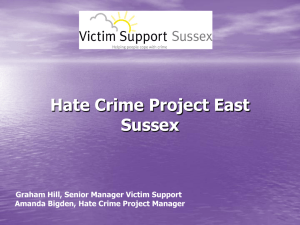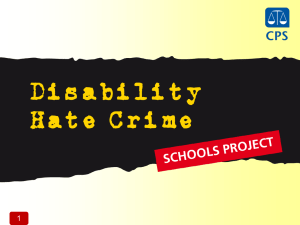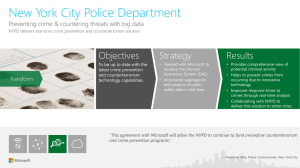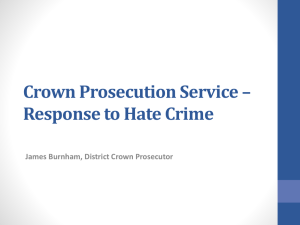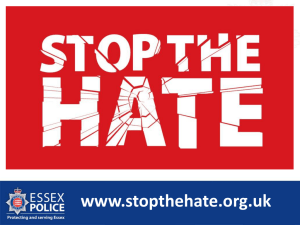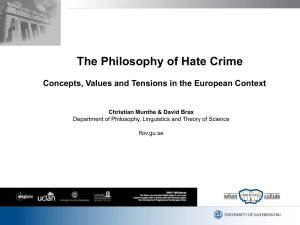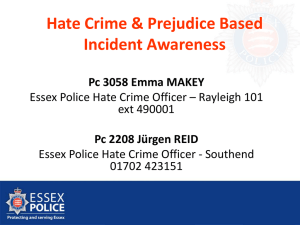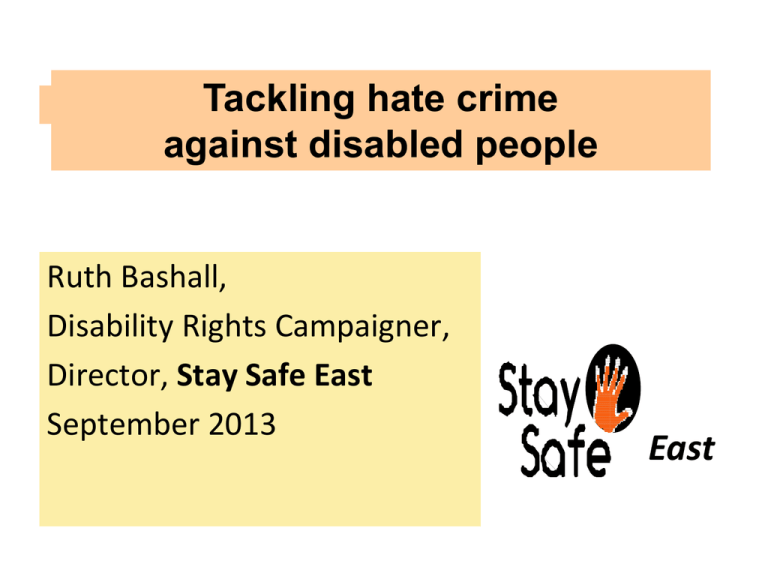
Tackling hate crime
against disabled people
Ruth Bashall,
Disability Rights Campaigner,
Director, Stay Safe East
September 2013
East
About Stay Safe East
A user- led organisation of disabled people
Hate crime, bullying, anti-social behaviour,
domestic and sexual violence, institutional
abuse
Accessible third party reporting site
Advocacy and casework
Informing disabled people of their rights
Working with partners for change
Prevention and inclusion work
Training and consultancy
East
What is hate crime?
A Hate Crime is
” Any crime that is perceived, by the victim
or another person, to have been motivated
by hostility or prejudice based on a
person’s race, religion, sexual orientation,
disability or transgender identity.”
Hate crime is…
• Name calling, spitting
• Grabbing someone’s walking frame,
crutches or cane
• Deliberately doing something that will make
the person’s impairment worse
• Bullying at school, on the bus or a day
centre
• Repeated threats
• Vandalism, arson
• Physical or sexual assault
• Murder
• Disabled people can be victims of racist,
homophobic, faith or transgender hate
crime as well as disability hate crime
Harassment and violence against Deaf and disabled people
• Disabled people are 3 times more likely to experience violence
than non-disabled people (Source: United Nations)
BME and LGBT disabled people more likely to be victims of
harassment (Galop); 80% of young people with Special
Educational Needs Statements have being bullied
• British Crime Survey 2010/11: 65,000 disability hate crimes
• Disabled people less likely to have confidence in the police and
the criminal justice system or to be satisfied with the service
they get
• In 2011/12, 43,748 hate crimes were recorded by the police:
– 35,816 (82 per cent) were race hate crimes
– 1,621 (4 per cent) were faith hate crimes
– 4,252 (10 per cent) were sexual orientation hate crimes
– 315 (1 per cent) were transgender hate crimes
– 1,744 (4 per cent) were disability hate crimes (disabled
people are between 16% and 20% of the population)
(Source: Home Office 2012)
A human right for everyone?
UN convention on rights of persons with disabilities
Article 16: Freedom from exploitation, violence and
abuse
“States… shall take all appropriate measures to protect
persons with disabilities both within and outside the
home from all forms of exploitation, violence and abuse
including their gender based aspects.”
Human Rights Act (UK law) Article 3
The right to be free from torture, inhuman or degrading
treatment or punishment
We have the right
To be treated
with respect
To be safe
To be treated
equally
To privacy
To make our
own decisions
To family life
Hate crime and the law
Civil law:
• Public authorities have a duty to “ have due regard to
eliminating victimisation and harassment” against disabled
people and other groups (Equality Act 2010)
• Housing Act 1996 Injunctions by landlords, repossessions etc
Criminal law
• Criminal Justice Act 2003
– Section 146: An increase in sentence if the offence can be
shown to be motivated wholly or partly by hostility towards
disabled people. However Disability hate crime is not a
crime in law– the same applies to transphobic hate crime
– Racist, homophobic and faith hate crime are crimes in law.
Barriers to getting justice or resolution
• Deaf and disabled people don’t know their
rights and see hate crime as ‘part of life’
• Barriers: communication, physical barriers,
information, lack of home visits, attitude to
disabled people
• Failure by agencies to identify hate crime
• Treated as anti-social behaviour and dealt
with by Safer Neighbourhood rather than by
Community Safety Unit who deal with hate
crime
• Disabled people in contact with agencies do
not always get justice
• Hate crime is slipping off the political
agenda and is no longer a priority for local
authorities and the police
Will the service
be accessible?
Who can I
Tell about this?
Will they put
me in a
home?
Will I be believed
and
respected?
•
•
•
•
•
•
•
•
•
Campaigning for action on disability hate crime:
the Waltham Forest experience
3 years of building partnerships and trust with police,
the council, housing and local community agencies
Stay Safe East’s input and expertise have been
welcomed
Active members of the Crime Reduction Partnership
(SafetyNet)
We use casework to inform campaigning and policy
Regular meetings with the Police Borough
Commander
Training for police and local authority
Starting work with schools
Monitoring and scrutiny – learning from cases
Involving our users through our Women’s Group
Some changes….
• 30% of cases refered to ASBRAC (anti-social behaviour
panel) are disabled people – actions are taken
• Victim support services are more accessible
• Disabled victims’ needs are being met more often than
before by police e.g. BSL interpreters
• Disabled people better informed and less isolated
• Positive leadership from police borough commander
• Disability lead officer in local police, victim’s champion in
local authority
• Police officers more aware
• Increasing numbers of hate crimes identified by the police
• Disability hate crime back on the agenda?
East
Some tips for action
East
• Support disabled people to report hate
crime
• DDPOs as independent third party
reporting sites for hate crime
• Inform disabled people about their rights
– Accessible materials and approach
– Talk to community groups and agencies in
contact with disabled people
– Focus on specific communities e.g Deaf
community, LGBT groups, refugees, families
of disabled people
• Educate police, social workers, housing
officers and other professionals
Getting involved
East
• Get your facts rights, bring evidence of what is
happening – local and national
• Speak to Councillors and your MPs
• Ask to meet with the police Borough Commander –
ask what he or she is doing about hate crime against
disabled people?
• Ask to join your local Crime Reduction Partnership
• Make allies – you can’t do this alone
• Challenge bad practice
• Be prepared to be there for the long run – and to
have to fight to get heard!
• Nothing will change unless we make it!
Nothing About Us Without Us!
Disabled people’s rights are
human rights
Contact us
Stay Safe East
90 Crownfield Road
London E15 2BG
T: 0208 519 7241
Mobile and SMS: 07587 134 122
director@staysafe-east.org.uk
East

